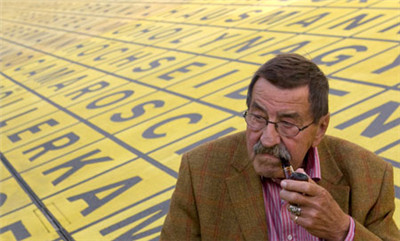Gunter Grass, the German novelist, social critic and Nobel Prize winner, died of undisclosed causes on April 13 in the German town of Lubeck. He was 87 years old. Grass wrote more than 30 plays, novels, books of poems, essays and memoirs. He was the author of “The Tin Drum”, an epic treatment of the Nazi era.
当地时间4月13日,诺贝尔文学奖得主、德国小说家、社会批评家君特•格拉斯在德国小镇吕贝克去世,享年87岁。格拉斯一生创作的剧本、小说、诗集、散文、回忆录逾30部。讲述纳粹时代的“史诗”《铁皮鼓》也出自他的笔下。
A broad-shouldered man with a drooping mustache, Grass spurned the German tradition of keeping a cool intellectual distance, insisting that a writer’s duty was to be at the frontline of moral and political debate.
他肩膀宽阔,胡子微垂;他对德国知识分子与世事疏离的传统嗤之以鼻;相反,他坚持认为,作家的责任就是站在道德与政治争论的最前线。

For many, he was the voice of a German generation that came of age in World War II and bore the burden of their parents’ guilt for the atrocities of the Nazis.
他是德国二战后一代人的代言人, 这一代人因为其父母一代与纳粹暴行的关联而承受重负。
However, Grass’ concealment until 2006 of the fact that he had served in a Nazi Waffen-SS regiment as a teenager cost him some of his moral authority. The Waffen-SS was the combat unit of the Nazi’s elite military police force.
但是,2006年格拉斯却说出了隐瞒已久的秘密:他十几岁时曾加入过纳粹武装党卫团。他的道德权威因此受到质疑。纳粹武装党卫军是纳粹精英宪兵部队的一支战斗部队。
Not even 12 when war broke out, Grass, like many other children, joined the Hitler Youth Movement.
战争爆发时,还不到12岁的格拉斯和许多小孩一样,加入了希特勒青年组织。
He was then drafted into a Waffen-SS tank division in 1944. He experienced the full horrors of war when more than half his company of mostly 17-year-olds were ripped to pieces in three minutes of shelling.
1944年,他应招加入武装党卫军某坦克师。在此期间,格拉斯目睹了战争的恐怖。他曾亲眼所在的连队一大半人在三分钟中的炮击中化为灰烬,而他们大都只有十七岁。
But the fact that he did not reveal this part of his history until 2006 brought accusations that he had been hypocritical when attacking others for failing properly to face up to Germany’s Nazi past.
格拉斯曾攻击那些不肯正确面对德国纳粹历史的人,而自己却直到2006年才公布了自己与纳粹相关的历史。于是,指责之声接踵而至,人们认为他是个伪善之人。
Life after war
战后生活
When Germany surrendered in 1945, Grass was briefly an American prisoner of war.
1945年德国投降,格拉斯短暂地成为了美军战俘。
He then worked on a farm, in a mine and as an apprentice stonemason before studying sculpture in Duesseldorf and West Berlin. He began writing poems and plays in the early 1950s, worked as a journalist, played in a jazz band, and illustrated some of his own books.
他在农场工作过,也去过矿井,做过石匠学徒,随后在杜塞尔多夫和西柏林学习雕塑。二十世纪五十年代早期,他开始创作诗歌与剧本,当过记者,参加过爵士乐队,还为自己的书画过插画。
Grass said he regretted the years in which he did not speak the full truth about himself. “I kept silent,” Grass wrote in his memoir.
格拉斯承认自己在没有说出真相的那些年里都生活在悔意之中。在自传中,他写到:“我曾保持沉默。”
Why was he attracted to the SS?
为何党卫军吸引了他?
“It was the newsreels,” he concluded. “I was a pushover for the prettified black-and-white ‘truth’ they served up.”
他总结道:“(吸引我的)是一个新闻纪录片,其中美化了的非黑即白的‘真理’打动了我。”
Trying to come to terms with the past is the basis for much of his writing, says Siegfried Mews, a Gunter Grass scholar at the University of North Carolina at Chapel Hill in the US.
来自美国教堂山镇北卡罗来纳大学的齐格弗里德•梅夫斯是一名研究君特•格拉斯的学者,他认为,努力面对过去是格拉斯很多作品的基础。
“He has produced works which were not necessarily eagerly welcomed,” Mews said in an interview with the US’ NPR. “That is true, for instance, of his first big novel, The Tin Drum, but you can’t just ignore it.”
在接受美国国家公共电台(NPR)采访时,梅夫斯说:“他的一些作品未必受到热捧,这是事实,他的第一部大部头小说《铁皮鼓》就是如此,但这并不意味着他无足轻重。”
“The Tin Drum” tells the story of a boy, Oskar, who gets a tin drum for his third birthday, then decides to protest Nazi rule by never growing up. As an eternal child, Oskar witnesses an adult world that is chaotic and cruel, with Jews being persecuted and fierce fighting erupting between Germans and Poles. It was made into an Oscar-winning film by German director Volker Schlondorff.
《铁皮鼓》讲述了一个名叫奥斯卡小男孩的故事。他在三岁生日那天得到了一个铁皮鼓,于是决定用“不长大”来反抗纳粹的统治。永远也长不大的奥斯卡目睹了成人世界的混乱与残忍,他看到了犹太人被迫害,也目睹了德国人与波兰人之间的惨烈斗争。这本书也被改编成同名电影,由德国导演沃尔克•施隆多夫指导,获得了奥斯卡奖。













